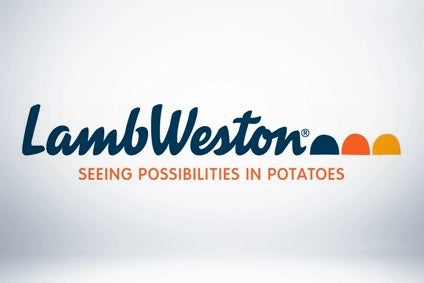
While Lamb Weston has withdrawn its financial guidance amid the uncertainties around coronavirus, a bright spot is emerging for the US-based french fries manufacturer – China.
China was the source of the Covid-19 outbreak in late December but is now showing early signs its spread is slowing down. However, the rest of the world is still grappling with the contagion, especially hard-hit countries like Italy, Spain and the US, while there is also a risk of a second wave of cases in China.

Discover B2B Marketing That Performs
Combine business intelligence and editorial excellence to reach engaged professionals across 36 leading media platforms.
Nevertheless, Lamb Weston is starting to see flickerings of an improvement in China, where the company saw foodservice demand tail-off in the early stages of the outbreak as the government imposed strict restrictions on people’s movements to contain the spread of the virus.
Lamb Weston president and chief executive Tom Werner, speaking to analysts yesterday (2 April) after the release of its third-quarter results, said: “In China, after the government placed severe social and movement restrictions that significantly reduced restaurant traffic, french fries demand declined about 50% for about a month. As restrictions have relaxed we’ve seen volume climb back to about 70% of pre-crisis demand today.”
UK-based private-label manufacturer Bakkavor, which counts China and the US as its largest export markets, also said the operating environment in China is starting to level out. “After a challenging period, this situation has now stabilised, our customers have reopened most of their stores, and our sites are resuming service as orders gradually rebuild,” Bakkavor told the London Stock Exchange today.
But risks still remain outside of China, especially in the US where the number of Covid-19-related deaths have already exceeded those in the Asian country.

US Tariffs are shifting - will you react or anticipate?
Don’t let policy changes catch you off guard. Stay proactive with real-time data and expert analysis.
By GlobalDataWerner added: “In the US, it’s still too early to determine how the impact on demand will play out. Normally, about 65% of all fries are purchased at quick- service restaurants (QSR), with another 20% purchased at full-serve restaurants. The remaining 15% is purchased at retail.
“However, with the adoption of more severe restrictions across more states, we’re seeing orders beginning to slow.”
In other Asian countries such as Japan, South Korea, Taiwan and Singapore, Lamb Weston said it had only seen “a modest impact on french fry demand”.
The company is now using China as a yardstick to try and gauge when demand will pick up.
Werner said: “If the China experience provides an appropriate guide, then we would expect QSR volumes to begin to recover at a faster rate, and for full-service restaurants after the more severe restrictions are relaxed.
“Traffic at full-service restaurants and operations in the US is expected to be down much more sharply than the QSRs. While many of these operators are taking steps to boost take-out and delivery sales, we expect this will make up only a fraction of lost business. So our sales to these types of customers are more at risk.”
In Europe, where the company operates through a joint venture – Lamb Weston Meijer – it is a similar picture.
“The impact of the virus on demand so far has been most pronounced in Italy after it adopted severe social movement restrictions,” Werner said. “Other European nations have since adopted similar restrictions, so we expect the decline in demand to accelerate in those countries as well, which will further negatively impact Lamb Weston Meijer’s results.”
But while foodservice demand has declined, Lamb Weston said orders at the retail level have “significantly increased as food-at-home consumption rises with the adoption of social distancing policies and families stocking their freezers”.
“We’ve taken steps to boost production of our retail products in order to meet the increased demand,” Werner said.





